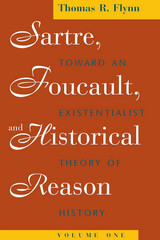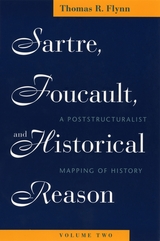4 books by Flynn, Thomas R.

The Ethics of History
John McCumber
Northwestern University Press, 2004
What is implied by "ethics of history"? The authors of this volume, internationally renowned philosophers and intellectual historians, address this question in all its novelty and ambiguity and develop varied perspectives on the place and nature of ethics in the philosophy, enterprise, and practice of history.
Is the whole historical process--largely consisting of the actions and sufferings of persons and groups--subject to ethical constraint? And what of the ways in which historians present their subject matter; are these methods subject to moral scrutiny? Although they approach these issues from different directions, the contributors agree in their critique of the correspondence theory of history, tin their acceptance of an unbridgeable gap between the past and the historian's present account, and in their call for a revision of the popular appeal to historical objectivity.
[more]

Sartre and Marxist Existentialism
The Test Case of Collective Responsibility
Thomas R. Flynn
University of Chicago Press, 1986
In this important book, Thomas R. Flynn reinterprets and evaluates Sartre's social and political philosophy, arguing that the existential ethics of Sartre's early phase is consistent with the Marxist-inspired views of his later writings. Displaying his mastery of Sartre's entire corpus, Flynn reconstructs Sartre's social ontology with its sensitive balance of the existentialist's respect for moral responsibility and the Marxist's sense of social causation. Flynn focuses on the issue of collective responsibility as a particularly apt test-case for assessing any proposed union of existentialist and Marxist perspectives.
The study begins with an examination of the uses of "responsibility" in Being and Nothingness and in several postwar essays. Flynn then concentrates on the Critique of Dialectical Reason, offering a thorough analysis of the remarkable social theory Sartre constructs there. A masterful contribution to Sartre scholarship, Sartre and Marxist Existentialism will be of great interest to social and political philosophers involved in the debate over collective responsibility.
The study begins with an examination of the uses of "responsibility" in Being and Nothingness and in several postwar essays. Flynn then concentrates on the Critique of Dialectical Reason, offering a thorough analysis of the remarkable social theory Sartre constructs there. A masterful contribution to Sartre scholarship, Sartre and Marxist Existentialism will be of great interest to social and political philosophers involved in the debate over collective responsibility.
[more]

Sartre, Foucault, and Historical Reason, Volume One
Toward an Existentialist Theory of History
Thomas R. Flynn
University of Chicago Press, 1997
Sartre and Foucault were two of the most prominent and at times mutually antagonistic philosophical figures of the twentieth century. And nowhere are the antithetical natures of their existentialist and poststructuralist philosophies more apparent than in their disparate approaches to historical understanding.
A history, thought Foucault, should be a kind of map, a comparative charting of structural transformations and displacements. But for Sartre, authentic historical understanding demanded a much more personal and committed narrative, a kind of interpretive diary of moral choices and risks compelled by critical necessity and an exacting reality. Sartre's history, a rational history of individual lives and their intrinsic social worlds, was in essence immersed in biography.
In Volume One of this authoritative two-volume work, Thomas R. Flynn conducts a pivotal and comprehensive reconstruction of Sartrean historical theory, and provocatively anticipates the Foucauldian counterpoint to come in Volume Two.
A history, thought Foucault, should be a kind of map, a comparative charting of structural transformations and displacements. But for Sartre, authentic historical understanding demanded a much more personal and committed narrative, a kind of interpretive diary of moral choices and risks compelled by critical necessity and an exacting reality. Sartre's history, a rational history of individual lives and their intrinsic social worlds, was in essence immersed in biography.
In Volume One of this authoritative two-volume work, Thomas R. Flynn conducts a pivotal and comprehensive reconstruction of Sartrean historical theory, and provocatively anticipates the Foucauldian counterpoint to come in Volume Two.
[more]

Sartre, Foucault, and Historical Reason, Volume Two
A Poststructuralist Mapping of History
Thomas R. Flynn
University of Chicago Press, 2005
Sartre and Foucault were two of the most prominent and at times mutually antagonistic philosophical figures of the twentieth century. And nowhere are the antithetical natures of their existentialist and poststructuralist philosophies more apparent than in their disparate approaches to historical understanding. In Volume One of this authoritative two-volume study, Thomas R. Flynn conducted a pivotal and comprehensive reconstruction of Sartrean historical theory. This long-awaited second volume offers a comprehensive and critical reading of the Foucauldian counterpoint.
A history, theorized Foucault, should be a kind of map, a comprehensive charting of structural transformations and displacements over time. Contrary to other Foucault scholars, Flynn proposes an "axial" rather than a developmental reading of Foucault's work. This allows aspects of Foucault's famous triad of knowledge, power, and the subject to emerge in each of his major works. Flynn maps existentialist categories across Foucault's "quadrilateral," the model that Foucault proposes as defining modernist conceptions of knowledge. At stake is the degree to which Sartre's thought is fully captured by this mapping, whether he was, as Foucault claimed, "a man of the nineteenth century trying to think in the twentieth."
A history, theorized Foucault, should be a kind of map, a comprehensive charting of structural transformations and displacements over time. Contrary to other Foucault scholars, Flynn proposes an "axial" rather than a developmental reading of Foucault's work. This allows aspects of Foucault's famous triad of knowledge, power, and the subject to emerge in each of his major works. Flynn maps existentialist categories across Foucault's "quadrilateral," the model that Foucault proposes as defining modernist conceptions of knowledge. At stake is the degree to which Sartre's thought is fully captured by this mapping, whether he was, as Foucault claimed, "a man of the nineteenth century trying to think in the twentieth."
[more]
READERS
Browse our collection.
PUBLISHERS
See BiblioVault's publisher services.
STUDENT SERVICES
Files for college accessibility offices.
UChicago Accessibility Resources
home | accessibility | search | about | contact us
BiblioVault ® 2001 - 2024
The University of Chicago Press









